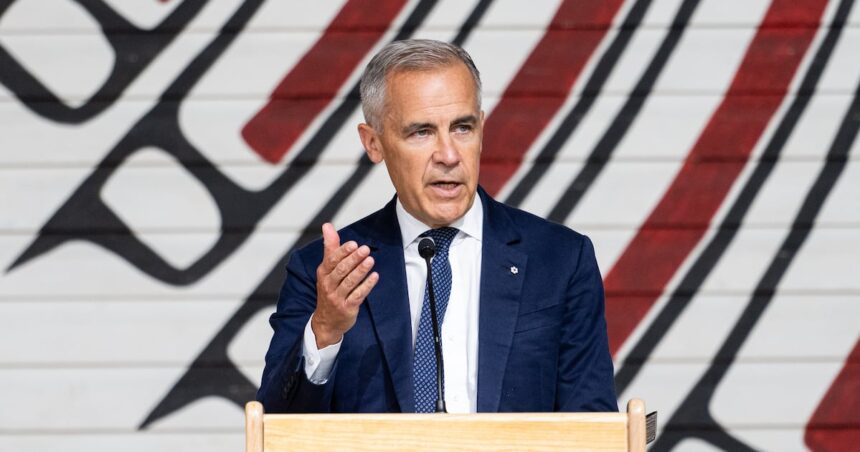Prime Minister Michael Carney stepped into familiar territory yesterday as he met with First Nations leaders in Vancouver, promising a “new approach” to major infrastructure projects across Canada. But for many Indigenous representatives at the table, the meeting represented yet another chapter in a long history of consultations that have delivered more promises than results.
“We’re here to listen first, act second,” Carney told the gathering of over 40 chiefs and representatives from British Columbia, Alberta, and Saskatchewan. “The mistakes of past governments won’t be repeated under my watch.”
The high-stakes meeting comes just three weeks after Carney’s government introduced Bill C-237, the Sustainable Infrastructure Acceleration Act, which aims to streamline approvals for critical infrastructure projects while maintaining what the government calls “meaningful consultation” with Indigenous communities.
Chief Darrell Ghostkeeper of Paddle Prairie Métis Settlement didn’t mince words about his skepticism. “I’ve sat at tables like this since 1997,” he told me after the meeting. “The faces change, but the conversations stay the same. One meeting doesn’t erase decades of broken processes.”
At issue is the government’s ambitious plan to fast-track approvals for major energy corridors, housing developments, and transportation networks that Carney has made central to his economic agenda. The Prime Minister has repeatedly stated these projects will create “tens of thousands of jobs” while addressing Canada’s infrastructure deficit, estimated at $570 billion according to the Federation of Canadian Municipalities’ 2024 infrastructure report.
But First Nations leaders worry the legislation’s “streamlined assessment process” could undermine their treaty rights and bypass proper consultation. A recent survey by the Assembly of First Nations found 83% of member communities expressed concerns about how the proposed law might affect their ability to participate meaningfully in decisions affecting their traditional territories.
“The courts have been clear about the duty to consult,” said Grand Chief Stewart Phillip of the Union of BC Indian Chiefs. “You can’t legislate your way around constitutional obligations.”
Carney, flanked by Indigenous Services Minister Anita Anand and Natural Resources Minister Jonathan Wilkinson, took extensive notes during the four-hour session. Several participants noted this personal engagement as a departure from previous governmental approaches.
“He wasn’t just going through the motions,” admitted Chief Willie Sellars of the Williams Lake First Nation. “But we’ve seen good listeners before. The real test is whether anything changes in the legislation before it becomes law.”
The government faces mounting pressure from business groups to deliver on its infrastructure promises. The Canadian Chamber of Commerce released a statement last week arguing that “regulatory inefficiency” costs the economy approximately $34 billion annually. Meanwhile, climate activists and some Indigenous communities have raised concerns about environmental impacts of expedited approvals.
This tension was evident in the streets outside the meeting, where approximately 150 protesters gathered with signs reading “Consent Not Consultation” and “Slow Down, Get It Right.”
Inside, Carney attempted to strike a conciliatory tone. “This isn’t about choosing between economic growth and respecting rights,” he said. “It’s about finding the path that achieves both.”
The Prime Minister pointed to three specific amendments his government is considering, including extending review timelines for projects affecting treaty lands, creating an Indigenous-led oversight committee with actual decision-making authority, and increased funding for community capacity to participate in assessment processes.
“Those are good starting points,” acknowledged Chief Crystal Smith of the Haisla Nation, whose community has partnered on the Cedar LNG project. “But the details matter. How these principles translate into the actual legislation will determine whether this was just another talk shop.”
For his part, Carney emphasized that yesterday’s meeting was the beginning of a process, not its conclusion. His office confirmed that a revised draft of the bill would be circulated to First Nations leaders before its second reading, expected in September.
“I understand the skepticism,” Carney told reporters afterward. “Trust is earned through actions, not words, and certainly not through a single meeting.”
As the fall parliamentary session approaches, the Prime Minister will need to navigate carefully between his promise to respect Indigenous rights and his government’s economic agenda. Polling from Abacus Data shows 64% of Canadians support accelerating infrastructure development, but 71% believe Indigenous communities should have a meaningful say in projects affecting their territories.
For many First Nations leaders leaving yesterday’s meeting, the jury remains out on whether Carney’s government truly represents a departure from the past.
“We’ve been down this road before,” said Chief Ghostkeeper. “But I’ll give him this – at least he’s acknowledging there’s a problem with the current approach. Now we need to see if he has the courage to fix it.”






